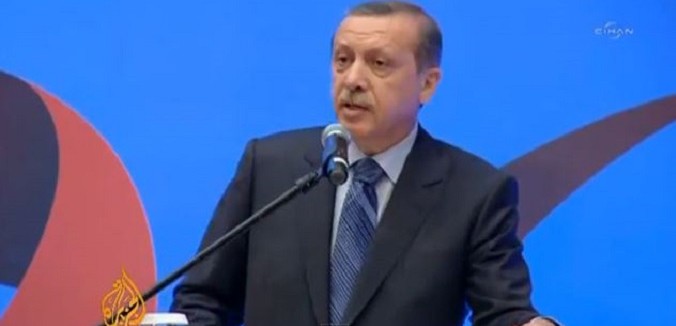Turkey’s Prime Minister Recep Tayyip Erdogan is being criticized for his response to the rioting that has engulfed the country, after the Islamist official dismissed thousands of protesters as “looters,” declared that foreign agents were behind popular calls for his government’s resignation, and implied that he had personally led an Arab Spring-style “Turkish Spring.” Even Twitter was not spared:
With Turkish media otherwise giving scant reports about the protests, many turned to social media outlets for information on the unrest. “There is now a menace which is called Twitter,” Erdogan said. “The best examples of lies can be found there. To me, social media is the worst menace to society.”
Meanwhile, U.S. Secretary of State John Kerry yesterday expressed concern over “reports of excessive use of force” by Turkish police. At least two people have died in the five days since the demonstrations began, including a 22-year-old who was shot Monday, and rights groups say that hundreds have been wounded.
U.S.-based Turkey experts Steven Cook and Michael Koplow have seen enough:
[T]he whole affair represents the way in which the ruling Justice and Development Party (AKP) has slowly strangled all opposition while making sure to remain within democratic lines. Turkey under the AKP has become the textbook case of a hollow democracy… Turkey, that “excellent model ” or “model partner ,” is also, as many put it, “more democratic than it was a decade ago.” There is a certain amount of truth to these assertions… Yet this mobilization has not come with a concomitant ability to contest politics. In fact, the opposite is the case, paving the way for the AKP to cement its hold on power and turn Turkey into a single-party state…
[E]ven as the AKP was winning elections at home and plaudits from abroad, an authoritarian turn was underway. In 2007, the party seized upon a plot in which elements of Turkey’s so-called deep state — military officers, intelligence operatives, and criminal underworld — sought to overthrow the government and used it to silence its critics. Since then, Turkey has become a country where journalists are routinely jailed on questionable grounds, the machinery of the state has been used against private business concerns because their owners disagree with the government , and freedom of expression in all its forms is under pressure…
Somehow, Washington’s foreign-policy elite saw Turkey as a “model” or the appropriate partner to forge a soft-landing in Egypt, Tunisia, Libya and elsewhere.
Cook and Koplow call for Washington’s foreign policy machinery to give up the idea that Turkey can serve as a “model” for the Arab and Muslim world, and to institutionalize the understanding that “Erdogan’s rhetoric on democracy has far outstripped reality.”
[Photo: AlJazeeraEnglish / Youtube]




